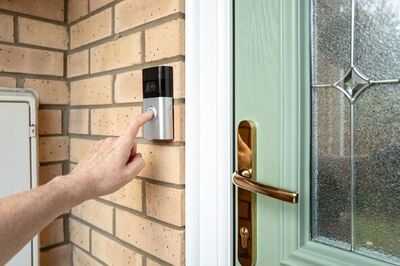It's no secret that these days every second UK household has a smart doorbell. The advanced tech gives homeowners a sense of security but most importantly, gives residents the ability to check their front doors at any time and communicate with whoever is ringing the bell. However, like any and every creation, there's a downside. The smart doorbell has its own set of drawbacks.
In a surprising twist, an electrical specialist has issued a warning to homeowners that their smart doorbells could potentially make them more susceptible to burglaries rather than safeguarding them. Charanjit Mannu, Director at Elec Training, is alerting people to the fact that criminals are actively seeking ways to exploit these very devices designed to protect homes. The electrical specialist shares: "The rise in smart doorbell installations across UK homes has given thieves new methods to scope out properties. Many homeowners trust these devices completely without understanding their security flaws."
Mannu explains that thieves employ various tactics to use these security devices against their owners. Some crooks jam the Wi-Fi signals to create blind spots, while others hack into inadequately secured devices to ascertain when homes are vacant.
"A common tactic we see is criminals checking when messages go unanswered on video doorbells. This gives them clear indicators of when nobody is home," he elaborates. "They also look for patterns in responses to assess your regular schedule."
The expert also highlights that default passwords represent a significant security weakness. Numerous manufacturers dispatch their devices with pre-set, easily predictable passwords that countless users fail to alter.
This corresponds with discoveries from a UK government study into consumer IoT security, which revealed that the mandate for distinctive, non-guessable passwords has only been completely adopted by 52% of manufacturers across their entire product range.
Mannu suggests that property owners can implement various measures to safeguard themselves, explaining: "First, always change default passwords to something unique and complex. Second, enable two-factor authentication if available. Third, check for and install security updates regularly."
He additionally recommends positioning smart doorbells tactically. "Place them where they can see visitors but not give a full view into your home or property layout."

The government research demonstrates that merely 27% of manufacturers have established requirements for supplying information regarding minimum security update timeframes across their complete product lines, making it challenging for consumers to understand how long their devices will receive security patches.
"Many people don't realise they need to keep their doorbell's firmware updated. Out-of-date software contains vulnerabilities that hackers can exploit," Mannu says. The inherent nature of some devices also poses a risk.
"Cheaper doorbells often send unencrypted video feeds that can be intercepted. It's worth spending more for units from reputable brands with strong encryption," he adds.
For those who already have smart doorbells, Mannu recommends a security audit. "Check if your model has known security issues. If updates are no longer available, consider replacing it with a newer, more secure version."
The government study also revealed that 48% of manufacturers surveyed expressed concerns about cyber attacks on their products, underlining the genuine risks these devices can present.
"Smart doorbells provide convenience, but that shouldn't come at the cost of security," Mannu concludes. "A few simple steps can help ensure your security devices actually keep you safe rather than making you a target."
You may also like

Texas plane crash: Massive fire erupts after multiple trucks hit near Hicks Airfield in Fort Worth

Emergency declared in New Jersey; New York City braces for torrential downpour, flooding

4 cousins die as car hits parked road-roller in Haryana

Strictly Come Dancing's Jowita Przystal breaks silence on emotional exit with Ross King

Luke Littler lands whopping £120k prize in brutal Luke Humphries demolition







